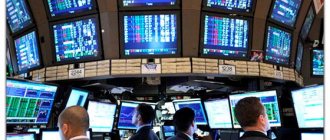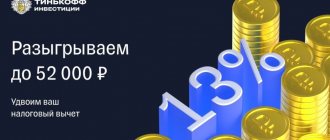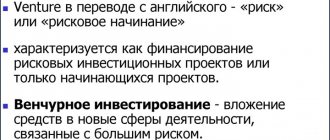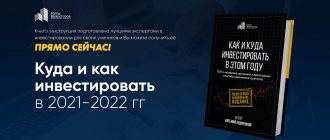Hello, friends.
After studying the statistics, I came to the conclusion that index funds have become a powerful force in the investment world today. According to statistics, a fifth of all money invested in American stock markets is invested in index funds.
What exactly does this mean and why is this situation interesting for us as novice investors? What are the advantages and disadvantages of investing in index funds? Let's try to figure this out together.
What are they and why are they needed?
An index fund is a type of mutual fund whose assets track a specific market index.
For example, the popular Dow Jones index includes shares of the TOP 30 US industrial giants, weighted by price. Thus, an index fund that tracks the DJIA is based on the stocks of these companies in approximately the same proportions as they occupy in the index.
Index funds are an indirect way to buy the entire market. That is, we depend on the success not of an individual issuer, but of the entire market sector as a whole. This provides the greatest opportunities for portfolio diversification.
Hurry up to take advantage of the doubling of the tax deduction until December 31, 2022.
Mutual funds and index-linked mutual funds are specifically designed to reduce investment risks and make the stock market accessible even to non-professionals.
Since the stock market historically always rises, and bearish declines last on average no more than 5 years, index funds are considered an ideal asset for cautious investors. For example, the legendary financier Warren Buffett calls them the best investment tool for retirees who do not want to comprehend the intricacies of active trading on the stock exchange.
Advantages
- Diversification: Like mutual funds, ETFs are diversified investments because they can provide exposure to dozens or hundreds of securities, such as stocks or bonds, with the purchase of just one fund. Diversification can reduce volatility by spreading market risk across multiple securities or asset types rather than just one. For example, Vanguard Total Stock Market ETF (VTI) invests in more than 3,500 US stocks. This applies to shares of companies in all sectors of the economy.
- Low Cost: ETFs are known for their low expense ratios, which typically range between 0.10% and 0.25%. Because ETFs are passively managed, operating costs are dramatically reduced since there is no need for research or analysis as is the case with actively managed mutual funds.
- Trading Flexibility: Since ETFs trade like stocks, they can be bought or sold throughout the day. This flexibility allows investors to place market orders, such as a stop loss, which can be set by the investor to sell the ETF at a specific price, typically to minimize losses.
- Niche trading: ETFs can be used to gain exposure to niche areas of the market that are not typically covered by investment funds. For example, ETFs can cover not only large sectors such as technology stocks, but also narrow subsectors such as artificial intelligence and robotics.
Advantages and disadvantages
The most obvious advantages of index funds:
- Minimum costs. Because quotes follow the underlying index, management fees for these investments are much lower than other alternatives. The average annual cost of holding a Western index fund is typically less than one percent. In Russia - 1-2%.
- Diversity. Index funds offer a balanced portfolio, allowing you to avoid dependence on the performance of one particular issuer. Simply put, when you invest in an index, you get a whole basket of different stocks at a low price.
- Efficiency. One of the principles of modern economics is that the entire market as a whole is more predictable than its individual participants. It is safer to invest in an industry than in a single issuer.
For the average investor, the most noticeable disadvantage of an index fund is its low return. Individual stocks and actively managed ETFs that are not linked to an index can provide much better returns than those linked to the market average.
Simply put, while an individual stock can suddenly shoot up 1,000%, an index fund will never do the same. There is nothing to be done, this is the price to pay for stability and predictability.
It all started with a small scandal
In fact, the history of index funds dates back to 1974, when the Journal of Portfolio Management published an article by economist and Nobel laureate Paul Samuelson, who pointed out the poor management efficiency of most mutual funds. The scandalous article stated that most of their managers should go out of business.
It turns out that they simply failed to provide investors with a decent return. Moreover, even exceed the market average. The situation required changes. Someone should have created a low-cost fund:
- with low commissions;
- with a low entry threshold;
- with low capital outflow;
- providing equity ownership that matches the structure of the S&P 500 .
Bogle founded the Vanguard group of mutual funds in 1975 in response to a changing situation. His index fund at first had an extremely weak position on Wall Street , it was even called un-American.
Investors initially showed little interest in this investment strategy. But in 2022, Vanguard has become one of the world's largest asset managers, largely through index funds.
This has given investors the opportunity to gain access to stock markets at vanishingly low prices. The leading asset management triumvirate in index investing now also includes BlackRock and State Street Global Advisors .
These three companies have become real winners in the industry, taking over almost the entire segment of generating passive income by following the exchange rate of the stock index.
List of all index funds in Russia
There are currently 28 index mutual funds and ETFs available on the Moscow Exchange.
Bonds/Eurobonds:
- FXMM;
- FXTB;
- FXRB;
- FXRU;
- RUSB;
- SBCB;
- VTBH;
- VTBB;
- G.P.B.M.;
- SBGB;
- GPBS.
Stock:
- FXKZ;
- FXCN;
- FXRL;
- FXUK;
- RUSE;
- FXUS;
- FXDE;
- FXAU;
- FXIT;
- FXJP;
- VTBE;
- SBMX;
- VTBA;
- SBSP;
- AKSP;
- AKNX.
Products - FXGD.
It is impossible to determine which active manager will be successful
A handful of the world's best-performing executives occasionally appear in financial magazines as proof of the benefits of active management. Despite this, it is almost impossible to predict who the next “star” will be even one year in advance. It is quite plausible to assume that the results of the “stars” are more related to simple luck. Multiple studies have shown that positive past performance by active managers and financial analysts does not guarantee that they will perform the same in the future.
Two of the world's most famous investors, W. Buffett and P. Lynch, both recommended passive (index) investing to anyone who is not a professional.
How to invest money in a foreign index fund
There are several options for Russian investors.
Foreign insurance company
A relatively simple and low-cost way to invest in bourgeois index funds. There are offers with both monthly and one-time commission fees and a different list of available products.
Russian or foreign bank
Some banks, as a privilege for VIP clients, provide the opportunity to invest in mutual funds and ETFs on the global market as part of the Private Banking program. However, this is an option only for those who can deposit at least 2-3 hundred thousand evergreens into their account. Other disadvantages are additional bank commissions and tax red tape.
Directly through the management company
Not the most profitable option for a Russian investor. First of all, because foreign management companies very rarely work directly with non-residents. And those who work require a bunch of documents from which they need to make notarized translations in paper form.
Through a broker
People's choice. Buying assets through brokers with access to international exchanges is the most convenient and cheapest way.
Reliable Russian brokers
| Name | Rating | pros | Minuses |
| Finam | 8/10 | The most reliable | Commissions |
| Opening | 7/10 | Low commissions | Imposing services |
| BKS | 7/10 | The most technologically advanced | Imposing services |
| Kit-Finance | 6.5/10 | Low commissions | Outdated software and user interface |
Active control
Active management in investments can be described in a nutshell as an attempt to apply human intellectual capabilities to make the most profitable transactions in the stock market. Today, active management is still the dominant investment model. Management companies try to find the most attractive stocks, bonds, funds and predict the most appropriate time to buy and sell them. Based on their findings, they purchase securities, often using leverage to increase potential profits. In addition to traditional stocks, bonds and funds, in their portfolios you can often see derivatives with increased risk - futures, options and other derivatives.
The goal of active managers is to generate profits, and they almost always strive to show returns above the market average. In pursuing their goals, active managers seek out information they believe is valuable and often make difficult choices about their trading system. Active managers try to cover hundreds of methods, including fundamental analysis, technical analysis, macroeconomic analysis, in their attempt to determine profitable directions for the investment market.
How to invest in a Russian index fund
There are also options.
mutual fund
The scheme is standard. I go to the Moscow Exchange website and look at the available options. Let's say I'm interested in mutual funds AKNX (Technology 100) and VTBE (VTB Equity Fund for Emerging Countries). I research information about the product, open an account with a broker (if I don’t already have one), make a deposit and buy an asset.
ETF
We proceed in the same way. We go to the Moscow Exchange website and look at the available options (for example, we were interested in “FinEx Cash Equivalents UCITS” and “FinEx Tradable Russian Corporate Bonds UCITS ETF”). Register with a broker, top up your account and buy.
Alternatives
The closest alternative is mutual funds and ETFs that are not linked to indexes. If we are not afraid of the risks associated with the success of individual issuers and higher servicing costs, we can invest in them.
The advantages of this choice are potentially much higher profits and a wider choice of assets. ETFs and mutual funds are available on the global market for anything from IT and medicine to wine, luxury goods and medical cannabis.
Disadvantages: high management fees and the need to constantly keep your finger on the pulse.
Disadvantages of ETFs
- Trading costs: Because ETFs trade like stocks, investors are required to pay a commission, which can range from $10 to $20 per trade. While some ETFs can be bought and sold commission-free, trading costs can be quite high if an investor makes frequent trades. Even if an investor only makes monthly purchases, as in a dollar-cost averaging strategy, the amount of small fees can make an ETF a more expensive investment compared to a no-load, no-transaction-fee mutual fund.
- Market Risk: Because many ETFs specialize in one concentrated area of the market, these funds may experience higher price fluctuations compared to a broader stock index such as the S&P 500.











